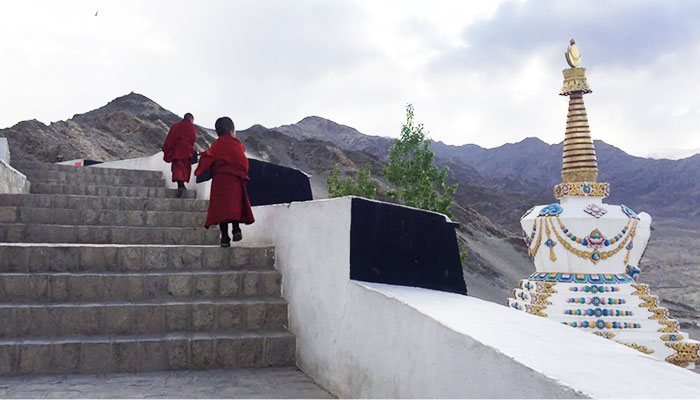HOW CAN WE HELP YOU? Call 1-800-TRY-CHOP
In This Section
How to Meditate and Calm Your ‘Monkey Mind’

Pediatric cardiologist Yoav Dori, MD, PhD, has practiced meditation for more than 30 years. He says the practice influenced his decision to switch from a career in engineering to medicine.
Editor's Note: Hello, summer! And welcome back to our seasonal series "Off Campus," where we share the adventures and hobbies of our Research Institute colleagues. Read along to discover what your co-workers do to de-stress and reset once they leave Osler Circle. Our first story is about Yoav Dori, MD, PhD, a longtime practitioner of meditation, composed by a writer who also has discovered the benefits of this mindful practice.
When I asked Yoav Dori, MD, PhD, a pediatric cardiologist at Children's Hospital of Philadelphia, about his meditation practice of more than 30 years, he flipped the question back to me: "What's your inclination about meditation?"
I told him that I believe meditation is about "noticing" thoughts and letting them pass through "without judgment."
"That definition is much closer to the truth than what most people think," Dr. Dori said. "The purpose of meditation is to wake up. And there is only one real way to wake up — that's to learn the truth about what the mind is and what it's doing, and to become familiar with it."
Meditation is not about the absence of thoughts, according to Dr. Dori, who is also the leader of the Jill and Mark Fishman Center for Lymphatic Disorders. Rather, the practice requires a person to become aware, and eventually let go of, the false stories we tell ourselves about any given situation — what's referred to in Buddhism as the "monkey mind."
"What happens most of the time, is that when a negative thought is initiated in your mind, it takes over, and then you're lost in some kind of story," Dr. Dori said. "That getting lost process is what prevents us from seeing the true nature of things."
We talked a bit about Pema Chödrön, the American Tibetan-Buddhist and beloved author who introduced me — and millions of other Westerners — to the practice of "loving-kindness," which involves focusing compassionate and loving energy toward yourself and others.
"In life, there are many difficulties which are opportunities that can encourage you to start trying to do something different — to practice," Dr. Dori said. "Impermanence is constantly hitting us, people around us are dying, and we are getting older, relationships form and break up. You found Pema Chödrön's When Things Fall Apart because something in your life didn't feel right. Does that sound familiar?"

Dr. Dori has attended meditation retreats around the country and the world, including in Lhasa, Tibet, with teacher Yongey Mingyur Rinpoche. (Courtesy of Yoav Dori)
It does. Still, when it comes to the teachings of Chödrön and meditation, I am merely a tourist — and a bit of a skeptic.
But Dr. Dori is in good company with other prominent biomedical researchers who came to meditation by way of science. Matthieu Ricard, who has been dubbed the "world's happiest man," was a molecular geneticist before he became a Buddhist monk. And it was the Dalai Lama who convinced prominent neuroscientist Richie Davidson to dedicate his life to the study of how meditation impacts the brain.
Research has shown that meditation can help alleviate a whole host of physical and mental aliments, including high blood pressure, anxiety, depression, and posttraumatic stress disorder. Imaging studies of Buddhist monks suggest that long-term meditative practices can actually change the structure and function of the brain.
While growing up in Israel, Dr. Dori said he was not exposed to meditation and mindfulness, though he unknowingly began practicing Tonglen — a form of meditation that involves taking on others' suffering in order to cultivate compassion. He came to the United States for his undergraduate education and remained in Minnesota to earn his doctorate in chemical engineering.
It was during his graduate studies that he met two fellow students who changed the course of his life.
"They were both from India, and they were extremely spiritual people," Dr. Dori said. "For four years, we often sat in the coffee shop and discussed spirituality and meditation."
Dr. Dori's new friends introduced him to The Complete Works of Swami Vivekananda. In his books, the renowned Indian philosopher presented a logical, nearly scientific argument about the benefits of training the mind toward attention and awareness.
After earning his doctoral degree, Dr. Dori was offered a postdoctoral fellowship to continue his engineering studies in Boston. But his heart was leading him in a different direction.
"A big part of meditation is learning about loving-kindness and compassion. And what I was doing in the sciences, there was some of that there, but I wanted a career that was more fitting to those practices," Dr. Dori said. "For me, that was medicine."
He applied to medical school, was accepted, and never looked back. Dr. Dori said his meditation practice helped to make him a better physician: "If you can be present with a patient and their family, and just listen, without distractions or judgment — those are important characteristics for a doctor."
Dr. Dori practices meditation for 20 minutes to an hour every morning and every evening. He also regularly attends meditation retreats, which sometimes involve complete silence for up to a week or longer, coupled with teachings and studying.
But Dr. Dori said one doesn't need to attend a weeklong retreat to reap the benefits of meditation. Anyone can start small by learning about how to meditate, whether through YouTube videos, books, or apps.
"Find something that you like, that speaks to you, and then start practicing within that," Dr. Dori said. "Ultimately, the objective of all of this is to go from an often-confused life that is inundated with suffering to one that is happy and joyful."


